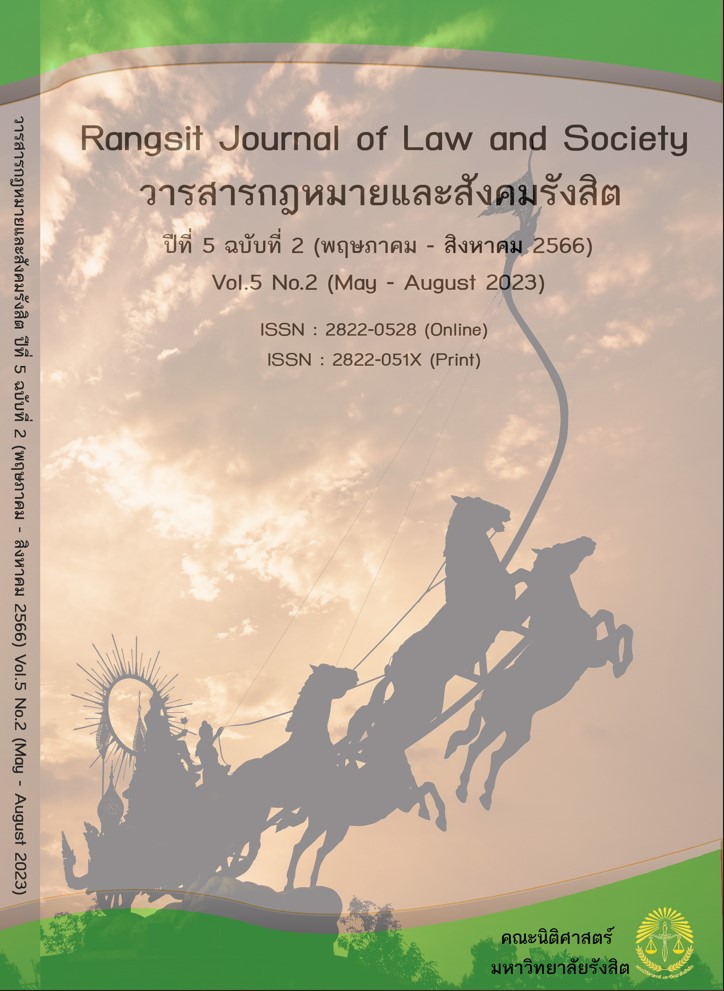การใช้ดุลพินิจของพนักงานอัยการในการยอมรับพยานหลักฐานทางนิติวิทยาศาสตร์
Main Article Content
บทคัดย่อ
บทความวิจัยนี้ มีวัตถุประสงค์เพื่อ 1) ศึกษาความหมายและลักษณะการใช้ดุลพินิจของพนักงานอัยการ 2) ศึกษาคุณค่าเชิงพิสูจน์ของพยานหลักฐานนิติวิทยาศาสตร์ และ 3) ศึกษาแนวทางการใช้ดุลพินิจของพนักงานอัยการในการยอมรับพยานหลักฐานทางนิติวิทยาศาสตร์ โดยใช้วิธีการศึกษาด้วยการวิจัยเชิงคุณภาพ ผลการวิจัยพบว่า ดุลพินิจของพนักงานอัยการเกี่ยวกับการสั่งฟ้องคดี มีความสำคัญอย่างมากในกระบวนการยุติธรรมทางอาญา อย่างไรก็ตาม การใช้ดุลพินิจในการยอมรับพยานหลักฐานทางนิติวิทยาศาสตร์ยังมีปัญหาเกี่ยวกับ 1) ขอบเขตการใช้ดุลพินิจของพนักงานอัยการ 2) ความรู้ความเข้าใจพยานหลักฐานทางนิติวิทยาศาสตร์ของพนักงานอัยการ 3) มาตรฐานการเก็บรวบรวม รักษาและการตรวจพิสูจน์พยานหลักฐานทางนิติวิทยาศาสตร์ และ 4) อำนาจการสอบสวนของพนักงานอัยการในคดีที่เกี่ยวกับพยานหลักฐานทางนิติวิทยาศาสตร์ ผู้วิจัยจึงได้เสนอให้มีการกำหนดแนวทางในการรับฟังพยานหลักฐานทางนิติวิทยาศาสตร์ การกำหนดให้พนักงานอัยการมีส่วนร่วมในการสอบสวนคดีที่เกี่ยวกับพยานนิติวิทยาศาสตร์ และ การจัดให้มีการฝึกอบรมพนักงานอัยการเกี่ยวกับพยานนิติวิทยาศาสตร์ ซึ่งจะช่วยให้การใช้ดุลพินิจในการยอมรับพยานหลักฐานนิติวิทยาศาสตร์ของพนักงานอัยการมีประสิทธิภาพมากยิ่งขึ้น
Article Details

อนุญาตภายใต้เงื่อนไข Creative Commons Attribution-NonCommercial-NoDerivatives 4.0 International License.
เอกสารอ้างอิง
กิตติพงษ์ กิตยารักษ์ และคณะ. (2551). ประมวลจริยธรรมและมาตรฐานการปฏิบัติงานของอัยการในนานาประเทศ. กรุงเทพมหานคร: เดือนตุลา.
เข็มชัย ชุติวงศ์. (2560). หลักนิติธรรมกับการสั่งคดีของพนักงานอัยการ. ใน เอกสารวิชาการส่วนบุคคลหลักสูตรหลักนิติธรรมเพื่อประชาธิปไตย. กรุงเทพมหานคร: สํานักงานศาลรัฐธรรมนูญ.
คณะวิทยาศาสตร์ประยุกต์ มหาวิทยาลัยธุรกิจบัณฑิตย์. (2559). การพัฒนาแนวทางการรับฟังพยานหลักฐานทางนิติวิทยาศาสตร์เพื่อพิสูจน์ความจริงในคดี. ใน รายงานการวิจัย. กรุงเทพมหานคร: สถาบันวิจัยรพีพัฒนศักดิ์ สํานักงานศาลยุติธรรม.
คณิต ณ นคร. (2561). กฎหมายวิธีพิจารณาความอาญา. (พิมพ์ครั้งที่ 9). กรุงเทพมหานคร: วิญญูชน.
จรัญ ภักดีธนากุล. (2560). คำอธิบายกฎหมายลักษณะพยาน. (พิมพ์ครั้งที่ 12). กรุงเทพมหานคร: สำนักฝึกอบรมกฎหมายแห่งเนติบัณฑิตยสภา.
จักรกฤษณ์ วรวีร์ และ ศุภชัย ศุภลักษณ์นารี. (2566). คุณค่าเชิงพิสูจน์ของพยานหลักฐานทางนิติวิทยาศาสตร์ ในคดีข่มขืนกระทำชำเรา. วารสารนิติ รัฐกิจ และสังคมศาสตร์ สำนักวิชานิติศาสตร์ มหาวิทยาลัยราชภัฏเชียงราย, 7(1), 131-150.
ณัฐ ตันศรีสวัสดิ์ และ ชินวัต สุวรรณทิพย์. (2549). การรับฟังพยานหลักฐานทางวิทยาศาสตร์. จุฬาลงกรณ์เวชสาร, 50(11), 763-767.
ประพันธ์ นัยโกวิท. (2539). การอำนวยความยุติธรรมในคดีอาญาโดยพนักงานอัยการ. บทบัณฑิตย์, 52(4), 25-40.
ภาวินี หาญธงชัย. (2564). เอกภาพการสอบสวนในคดีอาญา. วารสารบัณฑิตศึกษานิติศาสตร์, 14(3), 502-520.
มานะ เผาะช่วย. (2556). ระบบการดําเนินคดีอาญาในชั้นเจ้าพนักงาน : ศึกษาเปรียบเทียบ ระบบของประเทศอังกฤษ ฝรั่งเศส และประเทศไทย. ใน ดุษฎีนิพนธ์ หลักสูตรนิติศาสตรดุษฎีบัณฑิต. กรุงเทพมหานคร: มหาวิทยาลัยธรรมศาสตร์.
รัชดาภรณ์ น้อยแก้ว และวรธัช วิชชุวาณิชย. (2563). การศึกษาความสำคัญของพยานหลักฐานทางนิติวิทยาศาสตร์และการนำไปใช้ประโยชน์ในคดีอาญา: กรณีศึกษาสถานีตำรวจภูธรในพื้นที่จังหวัดสตูล. วารสารวิชาการอาชญาวิทยาและนิติวิทยาศาสตร์ โรงเรียนนายร้อยตำรวจ, 6(2), 167-180.
รุ่งโรจน์ แจ่มพิทยากรณ์. (2555). การสั่งคดีที่ไม่เป็นประโยชน์แก่สาธารณชนในชั้นพนักงานอัยการ. วารสารรามคำแหง ฉบับนิติศาสตร์, 1(2), 40-53.
สรรพัชญ รัชตะวรรณ. (2564). การสั่งไม่ฟ้องคดีอาญาของพนักงานอัยการด้วยเหตุคดีไม่เป็นประโยชน์ต่อสาธารณะ : ศึกษาเปรียบเทียบกับประเทศอังกฤษ. วารสารนิติศาสตร์, 1(68), 150-184.
สัญลักข์ ปัญวัฒนลิขิต. (2552). ประสิทธิภาพในการดำเนินคดีอาญา ศึกษาระบบการดำเนินคดีชั้นเจ้าพนักงานและชั้นศาล. ใน ดุษฎีนิพนธ์ หลักสูตรนิติศาสตรดุษฎีบัณฑิต. กรุงเทพมหานคร: มหาวิทยาลัยธรรมศาสตร์.
สารัตน์ ล้วนดี. (2560). แนวโน้มของการใช้พยานหลักฐานด้านนิติวิทยาศาสตร์ต่อการพิจารณาคดี. ใน ดุษฎีนิพนธ์ หลักสูตรปรัชญาดุษฎีบัณฑิต สาขาวิชานิติวิทยาศาสตร์และงานยุติธรรม. กรุงเทพมหานคร: มหาวิทยาลัยศิลปากร.
David W. Neubauer, Henry F. Fradella. (2010). America's Courts and the Criminal Justice System. (10th Ed.). CA: Wadsworth: Inc.
Davis, Kenneth C. (1969). Discretionary justice. Baton Rouge. LA: Louisiana: State University Press.
Green, Bruce A. and Roiphe, Rebecca. (2020). A Fiduciary Theory of Prosecution. American University Law Review, 69(3), 101-158.
Jeffrey Bellin. (2020). Theories of Prosecution. California Law Review, 108(4), 1203-1253.
John A. Lundquist. (1972). Prosecutorial Discretion - A Re-Evaluation of the Prosecutor's Unbridled Discretion and Its Potential for Abuse. DePaul Law Review, 21(2), 485-518.
Joycelyn M. Pollock. (2010). Ethical Dilemmas and Decisions in Criminal Justice. (6th Ed.,). CA: Wadsworth: Cengage Learning.
Kären M. Hess. (2009). Introduction to Law Enforcement and Criminal Justice. (9th Ed.). CA: Wadsworth: Cengage Learning.
Robert L. Misner. (1996). Recasting Prosecutorial Discretion. Journal of Criminal Law and Criminology, 86(3), 717-777.
Samuel J. Levine. (2017). The Potential Utility of Disciplinary Regulation as a Remedy for Abuses of Prosecutorial Discretion. Duke Journal of Constitutional Law & Public Policy, 12(2), 1-12.
United Nations Office on Drugs and Crime. (2014). The Status and Role of Prosecutors. New York: United Nations.

